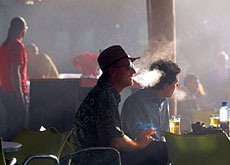Fight against tobacco gets a shot in the arm

Smokers may soon be given help to kick the habit with an anti-smoking vaccine.
Such a product is being developed by Swiss biotechnology company, Cytos, and is already being tested on human volunteers.
It is designed to prevent nicotine – the addictive component of tobacco – from reaching the brain where it has a pleasurable effect.
The treatment works by stimulating the immune system to produce antibodies that combine with nicotine and stop it from getting into the brain.
Normally the nicotine component is too small to produce this response but researchers have attached it to a large protein so that the immune system can recognise it.
The idea is that for smokers there will be no nicotine hit, so there is little point in persisting.
Preventing relapse
Wolfgang Renner, founder and chief executive of Cytos Biotechnology, told swissinfo the vaccine was designed to prevent a relapse in people who had quit smoking, as just one cigarette can reinforce the craving.
“What you usually find is that people take a decision to stop smoking and it goes well for a couple of days.”
“Then they are in a situation where they used to smoke, so they have a cigarette and that dose of nicotine destroys all their efforts. This is what we want to cure.”
Current tests in Britain on 40 non-smoking volunteers are establishing the minimum required dose for the vaccine. This study is nearing completion.
Jabs
A larger study in Switzerland with 360 smokers will begin in the autumn and should be completed by the middle of 2004. It is planned to administer three to four jabs per person to see whether the product actually works as intended.
Existing methods to stop smoking include nicotine replacement therapy – like patches, gums and sprays – and an antidepressant made by GlaxoSmithKline called Zyban.
These methods currently have a success rate of about 17-20 per cent.
“If a vaccine works, then the consequences for public health are huge,” said Jean-François Etter, lecturer at the institute of social and preventive medicine of Geneva University.
“It is going to be a real revolution in smoking prevention and treatment of tobacco dependency.”
Two other companies – Florida-based Nabi and Britain’s Xenova – are racing to produce a vaccine while Cytos says it could have a product on the market in four years.
“The question is whether scientists are going to produce a vaccine that is effective enough to really block the nicotine,” cautioned Etter.
Ethical debate
The prospect of a vaccine to combat tobacco addiction raises a host of ethical questions.
Besides treating people who are already dependent, children might be vaccinated one day to prevent them picking up the habit in the first place.
An estimated 80 per cent of smokers start in their teens. A vaccine given to non-smoking teenagers could prevent them from becoming addicted to nicotine.
“These questions need to be debated and answered,” said Etter. “As with many other technical innovations, the ethical debate is a bit late compared to the innovation itself.”
swissinfo, Vincent Landon
Switzerland has two million smokers in a population of less than eight million.
That is the third highest number per capita in Europe after Hungary and Greece.
Smoking is estimated to kill 8,000 people each year in Switzerland.
A study has shown that smoking-related illnesses cost the Swiss economy SFr10 billion in 1995 alone.
There’s been a huge increase in teenage smoking in recent years.
A majority of smokers (56 per cent) say they want to quit.
Cytos was founded in 1995 as a spin-off company of the Federal Institute of Technology in Zurich.
It develops drugs to prevent and cure chronic diseases, whether cardiovascular and neurodegenerative, or inflammatory such as arthritis and asthma.
They work by using the immune system to produce antibodies which interfere with specific disease mechanisms.
To prevent hypertension, for example, a drug will stimulate antibodies against the hormone which increases blood pressure.
Cytos has a pipeline of 20 products in development.

In compliance with the JTI standards
More: SWI swissinfo.ch certified by the Journalism Trust Initiative










You can find an overview of ongoing debates with our journalists here . Please join us!
If you want to start a conversation about a topic raised in this article or want to report factual errors, email us at english@swissinfo.ch.